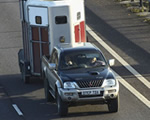 Go to main content
Go to main content
Archive Website of the UK government
Please note that this website has a UK government accesskeys system.
Main menu
Page menu
Travel and transport

Driving with a horse or livestock trailer

Driving with a live animal on board can be stressful. Follow this advice from the Highways Agency to make your journey safer and your horse more comfortable on the road.
Know the risks
There are risks in travelling with animals on board. If you break down or are involved in an accident, you could cause long delays, particularly if there are problems with your vehicle recovery insurance.
If your animals get out of the vehicle and become frightened, they could bolt into the road and cause a serious accident.
Both these risks can be reduced if you plan carefully and follow the guidelines below.
Make sure you are fit to tow
If you are towing a horse/livestock trailer or loosebox rather than driving a lorry-style horsebox, you should:
- read the general safety advice on 'Towing a caravan or trailer'
- check you have the correct driving licence for the weight you need to tow (see 'Towing a caravan or trailer')
- follow the extra tips in this section
You may also want to watch the Highways Agency Fit to Tow safety film - follow the link below. You can also download the Fit to Tow checklist below. You can order a copy of the Fit to Tow DVD from the Highways Agency Information Line on 0300 123 5000.
Before you set off
Check your roadside recovery insurance
If you are not fully covered with an animal on board you could face a bill for overnight stabling if you break down. There are specialist insurance brokers who offer horsebox/livestock trailer breakdown schemes. You can find them by putting the phrase 'equine insurance brokers' or 'livestock insurance brokers' into a standard search engine.
Be prepared
Get your animal used to travelling by taking a few short trips in the trailer before you set off on a longer journey.
Plan your journey and check the latest traffic information so you can avoid long delays.
As well as the standard emergency kit, make sure you have:
- plenty of hay or feed and water in case of breakdown or delay
- the phone number of your vet in case you need advice
If you are transporting a horse you should also take:
- reflective riding jacket
- warm coat for the horse if you are travelling in cold weather
Keep your horse safe and comfortable on the road
If you are transporting a horse, make sure it is restrained and has well-fitting boots or bandages. Note that this may not be appropriate for foals or unhandled stock.
If you break down
Do not take your animal out of the vehicle. Keep the animal as calm and comfortable as possible and make sure there is enough ventilation. In a trailer you should open the groom's door if it is away from traffic and you can do so safely. In a lorry you should stay with the animal if possible.
More information
For detailed information on towing you can download a copy of the Highways Agency magazine 'Hitched' by following the link below.
There is also a printed version that includes a UK road atlas. You can order a copy by calling the Highways Agency Information Line on 0300 123 5000 or emailing ha_info@highways.gsi.gov.uk
More useful links
Additional links
Simpler, Clearer, Faster

From 17 October, GOV.UK will be the best place to find government services and information
 Facebook
Facebook Twitter
Twitter StumbleUpon
StumbleUpon Delicious
Delicious Reddit
Reddit
